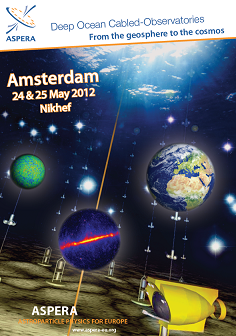Cabled observatories provide marine scientists with a large number of opportunities previously completely unavailable. In this workshop, taking place in NIKHEF, Amsterdam (the Netherlands) on the 24th and 25th of May 2012, marine scientists (geoscientists, biologists, oceanographers, etc) and astroparticle physicists will jointly discuss current and future research options using deep ocean cabled observatories, the future of ocean research.
Some of the current cabled observatories were constructed specifically for ocean research. Others, such as the three pilot neutrino detectors - ANTARES, NEMO and NESTOR - in the Mediterranean deep sea, have been built by astroparticle physicists in order to search for cosmic neutrinos.
In both cases, these observatories have led to major scientific breakthroughs in their respective fields, of which a large number is summarised in a recent report produced by ASPERA entitled “From the Geosphere to the Cosmos”.
Just before the start of construction of the first phase of KM3NeT, the cubic-kilometre sized neutrino detector in the Mediterranean sea (an ESFRI infrastructure), ASPERA considered it vital to open the floor for extensive discussions amongst scientists from different disciplines, all working around deep sea cabled observatories.
The first day of the workshop will be dedicated to current research that uses the cabled detectors in the Mediterranean, but also to the global perspective, to research carried out in cabled observatories in Canada and the United States. The second day is dedicated to the future. What scientific questions could be answered thanks to collaborations around cabled observatories in the Mediterranean and beyond?
For more information please visit the following pages:
Event overview
Program
Registration (the workshop is free to attend but registration is necessary)
Venue, Social program and accommodation
You can download a PDF of invitation that can be circulated to those who might be interested to attend the event here.
NEW! You can download a bulletin that summarises how to get to the venue and other practical information here.
Organising Committee:
Els de Wolf, Nikhef/University of Amsterdam, The Netherlands
Hans van Haren, Royal NIOZ, Texel, the Netherlands
Ino Agrafioti, IN2P3/CNRS, France
Local secretariat:
Eveline Schram, Nikhef, Amsterdam, The Netherlands
Email: Eveline.Schram [at] nikhef.nl
Tel: +31 - 20 - 592 2142
+31 - 20 - 592 5054
Some of the current cabled observatories were constructed specifically for ocean research. Others, such as the three pilot neutrino detectors - ANTARES, NEMO and NESTOR - in the Mediterranean deep sea, have been built by astroparticle physicists in order to search for cosmic neutrinos.
In both cases, these observatories have led to major scientific breakthroughs in their respective fields, of which a large number is summarised in a recent report produced by ASPERA entitled “From the Geosphere to the Cosmos”.
Just before the start of construction of the first phase of KM3NeT, the cubic-kilometre sized neutrino detector in the Mediterranean sea (an ESFRI infrastructure), ASPERA considered it vital to open the floor for extensive discussions amongst scientists from different disciplines, all working around deep sea cabled observatories.
The first day of the workshop will be dedicated to current research that uses the cabled detectors in the Mediterranean, but also to the global perspective, to research carried out in cabled observatories in Canada and the United States. The second day is dedicated to the future. What scientific questions could be answered thanks to collaborations around cabled observatories in the Mediterranean and beyond?
For more information please visit the following pages:
Event overview
Program
Registration (the workshop is free to attend but registration is necessary)
Venue, Social program and accommodation
You can download a PDF of invitation that can be circulated to those who might be interested to attend the event here.
NEW! You can download a bulletin that summarises how to get to the venue and other practical information here.
Organising Committee:
Els de Wolf, Nikhef/University of Amsterdam, The Netherlands
Hans van Haren, Royal NIOZ, Texel, the Netherlands
Ino Agrafioti, IN2P3/CNRS, France
Local secretariat:
Eveline Schram, Nikhef, Amsterdam, The Netherlands
Email: Eveline.Schram [at] nikhef.nl
Tel: +31 - 20 - 592 2142
+31 - 20 - 592 5054
